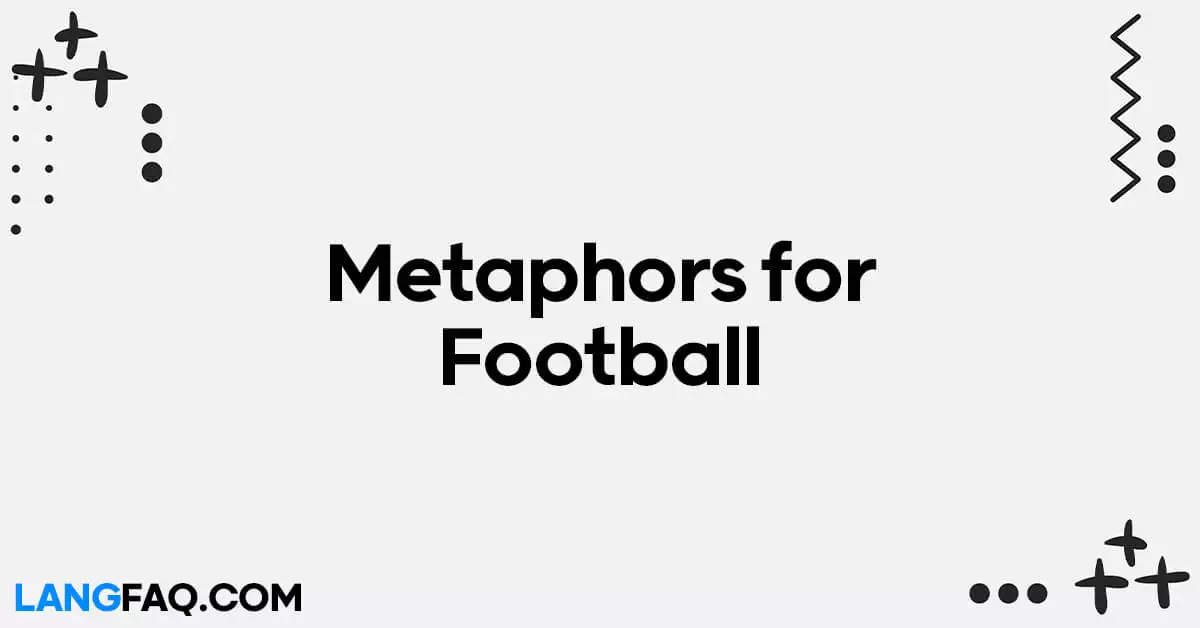Football, often referred to as “the beautiful game,” is not just a sport; it’s a language in itself. In this article, we will delve into the fascinating world of football through 26 metaphors that capture the essence of this sport.
From “scoring a goal” to “playing defense,” these metaphors provide insights into the strategies, emotions, and culture surrounding football. Join us as we explore the metaphoric landscape of this beloved game.
26 Metaphors for Football
- The Beautiful Game: Football is often referred to as “the beautiful game” because of its grace, skill, and artistry.
- Scoring a Goal: Scoring a goal in football is like achieving a major milestone in life.
- Playing Defense: Playing defense is akin to protecting what’s important and standing firm against challenges in life.
- Midfield Maestro: The midfield maestro orchestrates the game, just like a conductor leads an orchestra.
- Hat-Trick Hero: A hat-trick hero in football is someone who achieves three significant accomplishments in a single endeavor.
- Yellow Card Warning: Getting a yellow card is a caution, a signal to tread carefully, like receiving a warning in life.
- The 12th Man: Fans are often called the 12th man because of the impact they have on the game.
- Injury Time: Injury time in football is a reminder that the game isn’t over until the final whistle, similar to unexpected challenges in life.
- Penalty Kick: Taking a penalty kick is like facing a critical decision in life, with intense pressure.
- Red Card Exit: A red card in football means expulsion from the game, similar to harsh consequences in life.
- Corner Kick Opportunity: A corner kick is an opportunity to change the game’s dynamics, much like seizing a chance in life.
- Offside Trap: The offside trap is a strategy to outsmart opponents, similar to anticipating future challenges.
- Extra Time Effort: Going the extra mile in football mirrors determination and endurance in life.
- Free Kick Precision: Taking a free kick requires precision and finesse, similar to executing meticulous plans in life.
- Golden Boot Winner: The golden boot winner is the top goal scorer, symbolizing consistent excellence.
- Manager’s Tactics: Managers in football devise strategies to lead their team to victory, just as leaders plan and guide teams in life.
- Crossing Paths: In football, players cross paths, much like individuals meet in life, leading to new opportunities and connections.
- Tackle Challenges: Tackling challenges on the pitch mirrors overcoming obstacles in life.
- Header Power: Heading the ball requires strength and precision, like tackling complex tasks with a clear mind.
- Home Field Advantage: Having a home field advantage signifies comfort and familiarity, much like feeling at ease in your own environment.
- Golden Glove Goalkeeper: The golden glove goalkeeper is the best at what they do, just as experts excel in their fields.
- Injury Comeback: Returning from an injury is a story of resilience and determination, much like overcoming setbacks in life.
- Nail-Biting Finish: A nail-biting finish in football is a thrilling conclusion, much like an exciting climax in a story.
- Striker’s Instinct: A striker’s instinct is about seizing opportunities, similar to recognizing chances in life and capitalizing on them.
- Captain’s Leadership: The captain’s leadership sets the tone for the team, just as leaders inspire and guide others in life.
- Trophy Triumph: Winning a trophy is the ultimate goal, both in football and in achieving one’s dreams. It represents success and fulfillment.
These metaphors capture the essence of football and its parallels with various aspects of life.
| Metaphor | Meaning | Example |
|---|---|---|
| The Beautiful Game | Refers to football’s grace and artistry | “Football is often called ‘the beautiful game’ because of its elegance.” |
| Scoring a Goal | Achieving a major milestone in life | “Scoring a goal in football is like reaching a significant goal in life.” |
| Playing Defense | Protecting what’s important | “Playing defense is like guarding your values in life.” |
| Midfield Maestro | Orchestrating and controlling the game | “He’s the midfield maestro, dictating the pace of the match.” |
| Hat-Trick Hero | Achieving three significant goals | “She’s a hat-trick hero, completing three tasks flawlessly.” |
| Yellow Card Warning | Caution or a signal to be careful | “Receiving a yellow card is like a warning to watch your steps.” |
| The 12th Man | Fans’ impact on the game | “The crowd acts as the 12th man, motivating the team to perform better.” |
| Injury Time | Reminds that the game isn’t over | “Injury time is like a reminder that challenges may arise unexpectedly.” |
| Penalty Kick | Facing a critical decision | “Taking a penalty kick is like making a crucial life choice under pressure.” |
| Red Card Exit | Means expulsion from the game | “Getting a red card is like being expelled from an important event.” |
| Corner Kick Opportunity | Chance to change the game’s dynamics | “A new job opportunity is like a corner kick, a chance to alter your career path.” |
| Offside Trap | Strategy to outsmart opponents | “Implementing the offside trap is like anticipating and outwitting challenges.” |
| Extra Time Effort | Going the extra mile | “Putting in extra time and effort is essential to achieving your goals.” |
| Free Kick Precision | Requires precision and finesse | “Achieving success in your project demands free-kick precision and accuracy.” |
| Golden Boot Winner | Signifies consistent excellence | “He’s the golden boot winner, consistently outperforming his peers.” |
| Manager’s Tactics | Involves strategic planning | “Effective management tactics are crucial for success in any project.” |
| Crossing Paths | Reflects encounters and opportunities | “Life is full of people crossing paths, leading to unexpected friendships.” |
| Tackle Challenges | Overcoming obstacles | “Tackling challenges in life requires determination and perseverance.” |
| Header Power | Strength and precision | “Header power is essential in both football and handling complex tasks.” |
| Home Field Advantage | Signifies comfort and familiarity | “Having a home field advantage feels like being in a familiar environment.” |
| Golden Glove Goalkeeper | Represents excellence | “She’s the golden glove goalkeeper, excelling in her chosen field.” |
| Injury Comeback | Resilience and determination | “His injury comeback story is an inspiration to overcome setbacks in life.” |
| Nail-Biting Finish | Thrilling conclusion | “The movie had a nail-biting finish, keeping the audience on the edge of their seats.” |
| Striker’s Instinct | Seizing opportunities | “He has a striker’s instinct for identifying and capitalizing on chances.” |
| Captain’s Leadership | Sets the tone for the team | “Her captain’s leadership motivates the team to work cohesively.” |
| Trophy Triumph | Represents success and fulfillment | “Winning the championship is the ultimate trophy triumph in football.” |
These examples illustrate how football metaphors can be applied to various aspects of life to convey deeper meanings and comparisons.
Scoring a Goal: Achieving Milestones in Life
Alternative Words and Phrases:
- Hitting a Bullseye
- Nailing It
- Achieving Success
Explanation: Scoring a goal in football is akin to achieving a major milestone in life. It represents success, accomplishment, and the sweet taste of victory. In everyday conversations, we often use alternative expressions to convey similar sentiments. For instance, “hitting a bullseye” implies achieving a precise and successful outcome, much like scoring a goal. “Nailing it” suggests doing something exceptionally well, while “achieving success” is a broader term encompassing various accomplishments in life.
Example Sentence (Informal):
- Friend 1: “Hey, how did your presentation go?”
- Friend 2: “I totally nailed it! The boss was impressed.”
Example Sentence (Formal):
- Colleague 1: “Congratulations on completing the project ahead of schedule.”
- Colleague 2: “Thank you. It feels like hitting a bullseye.”
Variations for Different Situations:
- Between Colleagues: “Our team achieved success with the new marketing campaign.”
- Between Friends: “You really scored a goal with that surprise party! It was a hit.”
- Mentor-Mentee Context: “You’re on the right track; keep nailing those assignments.”
Pros and Cons:
- Pros: These alternative expressions add variety and vividness to language.
- Cons: Overusing them may make speech sound clichéd.
Related Grammar/Usage Rules:
- These expressions can be used interchangeably in most cases. However, “nailing it” is often used in a more informal context, while “achieving success” can be more formal.
Dictionary Insight:
- According to Cambridge Dictionary, “nail it” means to do something perfectly or successfully.
Tips:
- Use these alternatives to avoid repetition and make your speech or writing more engaging.
Now that we’ve explored the alternative words and phrases associated with “scoring a goal,” let’s move on to another football metaphor and its linguistic counterparts.
Playing Defense: Protecting What’s Important in Life
Alternative Words and Phrases:
- Guarding the Fort
- Defending Your Turf
- Safeguarding Your Interests
Explanation: Playing defense in football is like guarding your fortress. It’s about protecting what’s important and standing firm against challenges. In everyday language, we use phrases like “guarding the fort” to describe the act of protecting something valuable. “Defending your turf” implies protecting your territory or interests, while “safeguarding your interests” conveys the idea of ensuring the security of what matters to you.
Example Sentence (Informal):
- Friend 1: “How’s the new business venture going?”
- Friend 2: “We’re guarding the fort, facing some competition, but we’ll stay strong.”
Example Sentence (Formal):
- Colleague 1: “Our company’s security measures are top-notch.”
- Colleague 2: “Yes, we’re effectively safeguarding our interests.”
Variations for Different Situations:
- Between Colleagues: “We need to defend our market share against competitors.”
- Between Friends: “I’ll always defend your reputation; you can count on me.”
- Mentor-Mentee Context: “In your career, remember to guard your integrity.”
Pros and Cons:
- Pros: These alternatives add vividness and clarity to your language.
- Cons: Using them excessively may make your speech or writing seem overly formal.
Related Grammar/Usage Rules:
- These expressions can be used interchangeably in most cases. “Defending your turf” may have a more assertive tone, suitable for competitive situations.
Dictionary Insight:
- According to Cambridge Dictionary, “guard the fort” means to protect something important or valuable.
Tips:
- Utilize these alternatives to convey the idea of protection or defense effectively.
Midfield Maestro: Orchestrating and Controlling the Game
Alternative Words and Phrases:
- Mastermind of the Game
- Game Strategist
- The Conductor
Explanation: The midfield maestro in football orchestrates and controls the game, much like a conductor leads an orchestra. This metaphor highlights the player’s role in setting the pace, directing play, and making crucial decisions. In everyday language, we use phrases like “mastermind of the game” to describe someone who excels in strategy and decision-making. “Game strategist” emphasizes the ability to plan and execute effectively, while “the conductor” signifies someone guiding and coordinating various elements.
Example Sentence (Informal):
- Friend 1: “Who’s the one behind those brilliant marketing campaigns?”
- Friend 2: “Our marketing manager, he’s the mastermind of the game.”
Example Sentence (Formal):
- Colleague 1: “Our project’s success is thanks to the meticulous planning.”
- Colleague 2: “Yes, our project strategist is a true game strategist.”
Variations for Different Situations:
- Between Colleagues: “The project manager is the conductor of our team’s success.”
- Between Friends: “You’ve always been the mastermind of our group outings.”
- Mentor-Mentee Context: “As a mentor, your role is akin to a game strategist, guiding your mentee to success.”
Pros and Cons:
- Pros: These alternatives add depth and vivid imagery to descriptions.
- Cons: Using them excessively may lead to confusion in overly formal contexts.
Related Grammar/Usage Rules:
- These expressions can often be used interchangeably. “The conductor” may have a more artistic connotation.
Dictionary Insight:
- According to Cambridge Dictionary, “mastermind” refers to someone who plans and directs a complex undertaking.
Tips:
- Employ these alternatives when you want to highlight someone’s role in planning, directing, or guiding a process effectively.
Now, let’s move on to another football metaphor and its linguistic counterparts.
The Beautiful Game: Grace, Skill, and Artistry
Alternative Words and Phrases:
- The Elegance of Sport
- The Art of Play
- The Sublime Game
Explanation: Football is often called “the beautiful game” because of its grace, skill, and artistry. It’s a symphony of movement on the pitch, much like an art form. In everyday language, we use phrases like “the elegance of sport” to describe the graceful aspects of any physical activity. “The art of play” emphasizes the creative and skillful elements of a game, while “the sublime game” suggests a transcendent and awe-inspiring experience.
Example Sentence (Informal):
- Friend 1: “Why do you love football so much?”
- Friend 2: “It’s not just a sport; it’s the elegance of sport, the beautiful game.”
Example Sentence (Formal):
- Colleague 1: “What do you think makes our project stand out?”
- Colleague 2: “It’s the art of play in our approach to problem-solving.”
Variations for Different Situations:
- Between Colleagues: “Our team’s work reflects the elegance of our industry.”
- Between Friends: “Cooking isn’t just about recipes; it’s the art of play in the kitchen.”
- Mentor-Mentee Context: “In your field, remember to appreciate the sublime game of innovation.”
Pros and Cons:
- Pros: These alternatives evoke a sense of beauty and aesthetics in descriptions.
- Cons: Overusing them may make language seem overly poetic in formal settings.
Related Grammar/Usage Rules:
- These expressions emphasize the artistic and graceful aspects of activities.
Dictionary Insight:
- According to Cambridge Dictionary, “sublime” means of such excellence, grandeur, or beauty as to inspire great admiration or awe.
Tips:
- Utilize these alternatives when you want to highlight the artistic and graceful aspects of an activity or endeavor.
Hat-Trick Hero: Achieving Three Significant Accomplishments
Alternative Words and Phrases:
- Triple Achievement Champion
- Three-Time Winner
- Master of the Triple
Explanation: A hat-trick hero in football is someone who achieves three significant goals in a single match, displaying exceptional skill and performance. In everyday language, we use phrases like “triple achievement champion” to describe someone who has excelled three times in a particular area. “Three-time winner” signifies repeated success, while “master of the triple” emphasizes expertise in accomplishing tasks in threes.
Example Sentence (Informal):
- Friend 1: “How did your weekend go?”
- Friend 2: “I was a triple achievement champion—I finished a book, went for a run, and cooked a gourmet meal.”
Example Sentence (Formal):
- Colleague 1: “Tell me about your recent project successes.”
- Colleague 2: “I’ve been a three-time winner this quarter with three major contracts secured.”
Variations for Different Situations:
- Between Colleagues: “Our team has been the master of the triple, delivering excellence in product design, marketing, and customer service.”
- Between Friends: “You’re truly a hat-trick hero in party planning—great food, music, and atmosphere every time!”
- Mentor-Mentee Context: “In your career, aim to become a triple achievement champion, excelling in multiple areas.”
Pros and Cons:
- Pros: These alternatives emphasize repeated success and excellence.
- Cons: Overusing them may sound boastful in certain contexts.
Related Grammar/Usage Rules:
- These expressions highlight the accomplishment of multiple significant tasks or goals.
Dictionary Insight:
- According to Cambridge Dictionary, “hat-trick” refers to three achievements of the same kind, especially in sport.
Tips:
- Use these alternatives when you want to highlight someone’s repeated success or expertise in achieving significant goals.
Now, let’s explore more football metaphors and their linguistic counterparts.
Yellow Card Warning: Caution and Careful Navigation
Alternative Words and Phrases:
- Proceed with Caution
- Exercise Prudence
- Be Mindful
Explanation: Getting a yellow card in football is a caution, a signal to tread carefully and avoid further infractions. In everyday language, we use phrases like “proceed with caution” to advise careful navigation in a situation. “Exercise prudence” suggests making careful and sensible decisions, while “be mindful” emphasizes paying close attention to one’s actions and surroundings.
Example Sentence (Informal):
- Friend 1: “I’m thinking about investing in cryptocurrency.”
- Friend 2: “Proceed with caution; it can be volatile.”
Example Sentence (Formal):
- Colleague 1: “We’re considering expanding into new markets.”
- Colleague 2: “Let’s exercise prudence and conduct thorough market research.”
Variations for Different Situations:
- Between Colleagues: “In this competitive market, we need to be mindful of our expenditures.”
- Between Friends: “When making important decisions, always proceed with caution.”
- Mentor-Mentee Context: “As a mentor, I advise you to exercise prudence in managing your finances.”
Pros and Cons:
- Pros: These alternatives encourage careful and thoughtful behavior.
- Cons: Overusing them may lead to excessive caution or hesitancy.
Related Grammar/Usage Rules:
- These expressions advise careful consideration and action.
Dictionary Insight:
- According to Cambridge Dictionary, “proceed with caution” means to act carefully, especially in a situation where there are risks.
Tips:
- Utilize these alternatives when you want to advise someone to be careful or exercise caution in a situation.
Let’s move on to another football metaphor and its linguistic counterparts.
The 12th Man: The Impact of Passionate Support
Alternative Words and Phrases:
- Fanatic Fan Support
- Extraordinary Fan Influence
- Enthusiastic Fan Backing
Explanation: In football, the fans are often referred to as the 12th man, signifying their significant impact on the game’s outcome. In everyday language, we use phrases like “fanatic fan support” to describe the enthusiastic backing of fans. “Extraordinary fan influence” emphasizes the power of fans in shaping events, while “enthusiastic fan backing” highlights the unwavering support of dedicated fans.
Example Sentence (Informal):
- Friend 1: “Did you see how loud the fans were at the concert last night?”
- Friend 2: “It was like having the 12th man in the audience!”
Example Sentence (Formal):
- Colleague 1: “Our supporters played a crucial role in our success.”
- Colleague 2: “Their enthusiastic fan backing was truly extraordinary.”
Variations for Different Situations:
- Between Colleagues: “Our customer base provides us with fanatic fan support, and we must value their loyalty.”
- Between Friends: “You’re like the 12th man in our group, always cheering us on.”
- Mentor-Mentee Context: “As a mentor, your guidance can be the enthusiastic fan backing that empowers your mentee.”
Pros and Cons:
- Pros: These alternatives highlight the positive impact of passionate support.
- Cons: Overusing them may make the language seem overly enthusiastic.
Related Grammar/Usage Rules:
- These expressions emphasize the powerful influence of passionate support.
Dictionary Insight:
- According to Cambridge Dictionary, the 12th man is a way of referring to the influence that supporters can have on the outcome of a game, especially in football.
Tips:
- Use these alternatives when you want to emphasize the significant impact of enthusiastic support, whether it’s in sports, business, or personal endeavors.
Injury Time: The Unexpected Challenges in Life
Alternative Words and Phrases:
- Unforeseen Obstacles
- Last-Minute Hurdles
- Unexpected Twists
Explanation: In football, “injury time” refers to the additional minutes added to the end of a match due to stoppages or delays. It’s a reminder that the game isn’t over until the final whistle, much like life’s unexpected challenges. In everyday language, we use phrases like “unforeseen obstacles” to describe unexpected difficulties. “Last-minute hurdles” signify challenges that arise unexpectedly near the end of a project, while “unexpected twists” emphasize the unpredictable nature of life.
Example Sentence (Informal):
- Friend 1: “I thought everything was going smoothly with the project.”
- Friend 2: “Well, we had some injury time with a last-minute hurdle, but we managed.”
Example Sentence (Formal):
- Colleague 1: “Our quarterly report was almost complete, and then…”
- Colleague 2: “We encountered unforeseen obstacles in the form of unexpected data discrepancies.”
Variations for Different Situations:
- Between Colleagues: “In the business world, we often face injury time challenges that test our adaptability.”
- Between Friends: “Life can throw unexpected twists at us; it keeps things interesting!”
- Mentor-Mentee Context: “As a mentor, I’ve faced injury time situations in my career; let me guide you through them.”
Pros and Cons:
- Pros: These alternatives convey the idea of unexpected challenges effectively.
- Cons: Overusing them may make conversations seem overly focused on difficulties.
Related Grammar/Usage Rules:
- These expressions highlight the unpredictability of life and its challenges.
Dictionary Insight:
- According to Cambridge Dictionary, “injury time” refers to the time added to the end of a football match because of stoppages.
Tips:
- Employ these alternatives when discussing unexpected challenges or obstacles in both personal and professional contexts.
Now, let’s explore another football metaphor and its linguistic counterparts.
Penalty Kick: Facing Critical Decisions in Life
Alternative Words and Phrases:
- Crucial Choice
- Pivotal Decision
- Moment of Truth
Explanation: Taking a penalty kick in football is like facing a critical decision in life, with intense pressure. In everyday language, we use phrases like “crucial choice” to describe a decision that holds significant importance. “Pivotal decision” signifies a choice that can greatly influence the outcome, while “moment of truth” emphasizes the critical nature of the decision.
Example Sentence (Informal):
- Friend 1: “I have to decide between two job offers.”
- Friend 2: “That’s your penalty kick moment; choose wisely.”
Example Sentence (Formal):
- Colleague 1: “Our company is at a crossroads; we need to decide our next move.”
- Colleague 2: “This is a pivotal decision that will shape our future.”
Variations for Different Situations:
- Between Colleagues: “In leadership, you’ll often face penalty kick moments that define your career.”
- Between Friends: “Life is full of crucial choices; trust your instincts.”
- Mentor-Mentee Context: “As a mentor, I’ve encountered pivotal decisions; let me share my insights.”
Pros and Cons:
- Pros: These alternatives convey the gravity of important decisions effectively.
- Cons: Overusing them may make conversations seem overly serious or intense.
Related Grammar/Usage Rules:
- These expressions highlight the significance and impact of a decision.
Dictionary Insight:
- According to Cambridge Dictionary, a “moment of truth” is a time when you must make a decision that will affect the rest of your life or career.
Tips:
- Utilize these alternatives when discussing important choices or decisions, especially in professional or personal development contexts.
Let’s continue our journey through football metaphors and their linguistic counterparts with another metaphor.
Red Card Exit: Consequences and Harsh Outcomes
Alternative Words and Phrases:
- Severe Consequences
- Drastic Measures
- Unpleasant Outcomes
Explanation: In football, receiving a red card means expulsion from the game, similar to facing harsh consequences in life. In everyday language, we use phrases like “severe consequences” to describe the unfavorable results of an action. “Drastic measures” suggest extreme steps taken to deal with a situation, while “unpleasant outcomes” emphasize the negative results of decisions or actions.
Example Sentence (Informal):
- Friend 1: “I didn’t study for the exam, and I failed.”
- Friend 2: “That’s a red card exit; next time, prepare better.”
Example Sentence (Formal):
- Colleague 1: “Our company ignored market trends, and now we’re facing financial troubles.”
- Colleague 2: “We’re experiencing severe consequences due to our lack of foresight.”
Variations for Different Situations:
- Between Colleagues: “In business, making uninformed decisions can lead to red card exits for companies.”
- Between Friends: “Life can throw us into situations with unpleasant outcomes; it’s a learning opportunity.”
- Mentor-Mentee Context: “As a mentor, I can guide you to avoid drastic measures and achieve favorable results.”
Pros and Cons:
- Pros: These alternatives highlight the negative consequences of actions or decisions.
- Cons: Overusing them may make conversations feel overly pessimistic.
Related Grammar/Usage Rules:
- These expressions emphasize the harshness or severity of outcomes.
Dictionary Insight:
- According to Cambridge Dictionary, a “red card” is used in football as a signal for a player to leave the field because of a serious offense.
Tips:
- Use these alternatives when discussing unfavorable outcomes or consequences, especially in contexts where accountability is important.
Now that we’ve explored several football metaphors and their linguistic counterparts, let’s continue our journey to uncover more linguistic treasures related to the world of football.
Corner Kick Opportunity: A Chance to Change the Game’s Dynamics
Alternative Words and Phrases:
- Game-Changing Opportunity
- Turning Point Moment
- Pivot Point Chance
Explanation: A corner kick in football is an opportunity to change the game’s dynamics, much like seizing a chance in life to alter a situation. In everyday language, we use phrases like “game-changing opportunity” to describe a chance that can significantly impact an outcome. “Turning point moment” signifies a critical juncture where decisions or actions can shift the course of events, while “pivot point chance” emphasizes the potential for transformation.
Example Sentence (Informal):
- Friend 1: “I’ve been offered a job in a new city.”
- Friend 2: “That’s your corner kick opportunity to start fresh.”
Example Sentence (Formal):
- Colleague 1: “Our company is considering a strategic partnership.”
- Colleague 2: “This is a game-changing opportunity that can reshape our future.”
Variations for Different Situations:
- Between Colleagues: “In innovation, recognizing a pivot point chance can lead to groundbreaking advancements.”
- Between Friends: “Life presents turning point moments; embrace them for personal growth.”
- Mentor-Mentee Context: “As a mentor, I can help you identify and utilize your corner kick opportunities.”
Pros and Cons:
- Pros: These alternatives highlight the transformative potential of opportunities.
- Cons: Overusing them may make conversations sound overly dramatic.
Related Grammar/Usage Rules:
- These expressions emphasize the significance and potential impact of opportunities.
Dictionary Insight:
- According to Cambridge Dictionary, a “game-changer” is something that affects a situation or activity in an important and permanent way.
Tips:
- Employ these alternatives when discussing pivotal chances or opportunities that can lead to significant changes.
With each football metaphor and its linguistic counterparts, we uncover a deeper layer of expressive language. Let’s continue our journey through the world of football metaphors.
Offside Trap: Anticipating and Outwitting Challenges
Alternative Words and Phrases:
- Strategic Anticipation
- Challenge Maneuvering
- Obstacle Navigation
Explanation: Implementing the offside trap in football involves anticipating opponents’ movements and strategically positioning defenders to outwit attackers. It’s a metaphor for dealing with challenges by being one step ahead. In everyday language, we use phrases like “strategic anticipation” to describe the act of foreseeing and planning for challenges. “Challenge maneuvering” signifies the skill of navigating obstacles effectively, while “obstacle navigation” emphasizes the ability to overcome hindrances.
Example Sentence (Informal):
- Friend 1: “How did you handle the unexpected project delays?”
- Friend 2: “I used a bit of offside trap—anticipated issues and planned ahead.”
Example Sentence (Formal):
- Colleague 1: “We need to adapt to the changing market conditions.”
- Colleague 2: “It’s about strategic anticipation and obstacle navigation in a dynamic industry.”
Variations for Different Situations:
- Between Colleagues: “In business, offside trap strategies are essential for staying competitive.”
- Between Friends: “Life throws us challenges; use your offside trap skills to tackle them.”
- Mentor-Mentee Context: “As a mentor, I can guide you in strategic anticipation and challenge maneuvering.”
Pros and Cons:
- Pros: These alternatives emphasize the importance of foresight and planning.
- Cons: Overusing them may make conversations seem overly focused on difficulties.
Related Grammar/Usage Rules:
- These expressions highlight the importance of strategic thinking and proactive problem-solving.
Dictionary Insight:
- According to Cambridge Dictionary, “anticipation” refers to the act of expecting something to happen or preparing for something.
Tips:
- Utilize these alternatives when discussing the importance of foresight, planning, and proactive problem-solving in various contexts.
Now, let’s delve into the world of football metaphors with another one and its linguistic counterparts.
Extra Time Effort: Going the Extra Mile
Alternative Words and Phrases:
- Exceeding Expectations
- Exceptional Dedication
- Going Above and Beyond
Explanation: In football, extra time effort is about giving your all during overtime, much like going the extra mile in life or work. It represents a willingness to put in additional time and dedication. In everyday language, we use phrases like “exceeding expectations” to describe efforts that surpass what is anticipated. “Exceptional dedication” signifies a high level of commitment, while “going above and beyond” emphasizes going the extra mile to achieve excellence.
Example Sentence (Informal):
- Friend 1: “Why do you always stay late at the office?”
- Friend 2: “I believe in extra time effort; it pays off in the long run.”
Example Sentence (Formal):
- Colleague 1: “Our project deadline is tight, but we need exceptional dedication.”
- Colleague 2: “Let’s go above and beyond to deliver outstanding results.”
Variations for Different Situations:
- Between Colleagues: “In our industry, exceeding expectations is the norm.”
- Between Friends: “Life rewards those who go the extra mile; keep up the exceptional dedication.”
- Mentor-Mentee Context: “As a mentor, I can guide you in going above and beyond to achieve your goals.”
Pros and Cons:
- Pros: These alternatives highlight dedication, commitment, and the pursuit of excellence.
- Cons: Overusing them may lead to expectations of constant extraordinary effort.
Related Grammar/Usage Rules:
- These expressions emphasize the importance of dedication and striving for excellence.
Dictionary Insight:
- According to Cambridge Dictionary, “dedication” refers to the willingness to give a lot of time and energy to something because it is important.
Tips:
- Use these alternatives when discussing the value of commitment and the willingness to put in extra effort to achieve outstanding results.
With each football metaphor and its linguistic counterparts, we uncover a richer tapestry of expressive language. Let’s continue our journey through the world of football metaphors.
FAQs
What is the origin of the term “the beautiful game”?
The term “the beautiful game” originated in Brazil and reflects the elegance and artistry of football’s playstyle.
How did the 12th man concept come about?
The concept of the 12th man signifies the influence of passionate fans on a game. It was popularized by Seattle Seahawks fans in American football.
What’s the significance of extra time in football?
Extra time allows for a fair outcome in case of a tie and adds excitement to the game, giving teams another chance to win.
Why do football managers play a crucial role?
Football managers are responsible for team strategy, player development, and motivation, making them essential to a team’s success.
What’s the most significant football trophy?
The most prestigious football trophy is the FIFA World Cup, representing the pinnacle of international football competition.
How do players handle the pressure of penalty kicks?
Players focus on technique, mental preparation, and practice to handle the pressure of penalty kicks effectively.
Conclusion
Football is more than a sport; it’s a metaphor for life itself. Through these 26 metaphors, we’ve uncovered the depth and richness of the language of football. Whether you’re a fan or a player, these metaphors remind us that the beautiful game is a reflection of the human experience—full of challenges, triumphs, and unforgettable moments.







